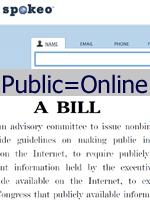
The Other Side of Public = Online
Submitted by rthomas on Wed, 12/20/2017 - 14:43

Thursday, May 13, 2010
David Brinn’s The Transparent Society points out a central truth in the struggle between privacy and accountability: everyone wants accountability for everyone else, and privacy for themselves. It’s the same ethic behind the Onion article: Report: 98 Percent Of U.S. Commuters Favor Public Transportation For Others.
Two recent developments showcase that tension: Sen. John Tester (D-MT) introducing the Public Online Information Act (POIA) and Arkansas Attorney General Dustin McDaniel investigating the Web site Spokeo.com to see if it violates consumers’ privacy rights.
What connects these two events is that they are both making it easier for people to access public records. The impetus behind POIA is summed up by the bumpersticker-ready blog headline “Public=Online.” If Sen. Tester’s bill passes, federal agencies will be required to post all material online that currently falls under the Freedom of Information Act (FoIA). Because if it’s truly public, it should be online—available to anyone (or at least anyone with internet access).
Spokeo simply takes that same ethic and applies it to the rest of us. Now, because they don’t have FoIA to guide their decisions, they simply assume that any information that we don’t hide behind privacy settings is public. Ditto information that we allow third-parties (like the phone company) to publish about us. And then there’s Google, whose Street View likely has a picture of our house. Here’s my former home:

And here’s where I used to park my car, behind my home.

Here’s my former neighbor walking with her daughter behind her house (blurred, but I know the shirt, which reads “#1 Grandma”).

I don’t think any of these alone are so spooky, and that’s where Spokeo comes in. The service cheerfully mashes up all the data it can about anyone and presents it on a single page. At the bottom of this post is the profile page of a friend of mine who allowed me upload this image, provided I blurred out her name. But on Spokeo, the information is all too clear.
There are a few issues here. First is that my friend didn’t know about this service, so, even though Spokeo claims that they’ll remove people from their database upon request, who even knows about the service in the first place? Second, a lot of this information is wrong. Examples:
- Her middle initial is R, not E
- She doesn’t live at this address (nor does she live with her parents)
- Her child is a girl, not a boy,
- She’s a Virgo, not a Leo
- She doesn’t own pets
- She doesn’t enjoy shopping
I’ll write more about this tomorrow, but I want to add one final note of interest: Harrison Tang, the CEO of Spokeo, doesn’t show up on Spokeo.




